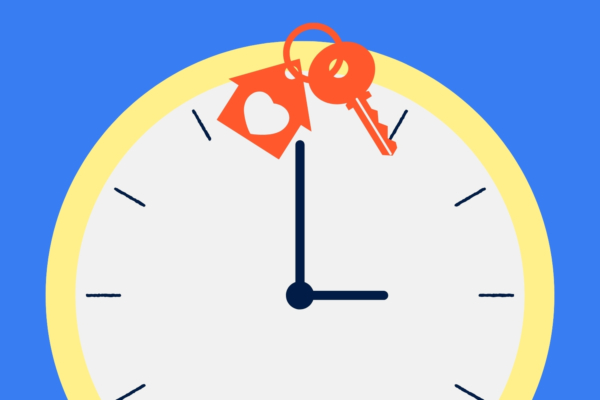
Ready to Move? Here's Your Checklist to Finding Your New Home

The prospect of buying a house is exciting but very daunting. There are so many factors to consider, and steps to take, before you’ll be able to sit back and relax in your new home. The most important step you can take is to thoroughly prepare yourself, taking the time to understand how the process actually works. Take a deep breath–we’ve put together a guide so you can figure out your budget, find a great house, and get approved for your mortgage.
Are You Financially Ready for a New Home?
Before you even attempt to find a new house, dig deep into your own financial status to ensure that you are ready to take such a big step. Here are some things to consider.
Income and Employment Status
Your lender will want to know more than your current income amount–they will want to see a work history (usually about 2 years) to ensure your source of income is reliable and stable. In order to demonstrate steady employment, you will need to pull some documents together. If you’re on payroll, you will likely just need to provide recent pay stubs and W-2s. If you are self-employed, however, you will likely need to submit tax returns and any other documents the lender requests.
Debt-to-Income Ratio
Your debt-to-income (DTI) ratio is a financial instrument that mortgage lenders use during the evaluation of your loan application. It helps the lender to see how much of your monthly income goes towards debt, so that they can get an idea of the amount of mortgage debt you can take on. For example, if your monthly debts are $2,450 and your monthly income is $7,000, your DTI is 2450/7000, or 35%. A DTI ratio of 50% or less is typically required to qualify for a mortgage.
Liquid Assets
In order to purchase a home, you will need some liquid assets to cover the down payment and closing costs. While putting a 20% down payment on a house improves your chances of getting approved, there are many lenders and loans available that require as little as a 3% down payment. VA and USDA loans allow qualified borrowers to put 0% down.
Closing costs vary, but you should expect to pay around 3%-6% of the total value of the house in closing costs. If you’re buying a house for $500,000, for example, you can expect your closing costs to range from $15,000 to $30,000.
Credit Health
You should pull your credit score as soon as possible so there are no surprises when you’re applying for a loan. In order to establish a good baseline credit score, you should have at least three lines of credit that you use and pay off to establish a consistent repayment history. It is recommended that you have a credit score of 620 or higher when applying for a conventional loan. If your credit score is poor, the lender could give you a higher interest rate, resulting in you paying more for the house in the end. Take some time to improve your credit score. A higher score is better for everyone involved!
The Home Buying Process
Once you have determined that you are ready to buy a house, it is time start the home buying process. Here is a simple checklist to follow.
1. List out home features and amenities
Before you even begin the process of finding a new home, you should have a clear idea of what you want. Looking at extremely different types of properties can be overwhelming, confusing, and will greatly slow down the process. Make a list of your must-haves, nice-to-haves, and deal breakers.
When you’re comparing your wishlist to an actual property, consider the difference between structural and cosmetic qualities. No property is going to have everything you want.
- Structural qualities include how the house is made, what it’s made of, and how it’s laid out (with some exceptions).
- Cosmetic qualities like counters, paint colors, and even the front door can be changed.
If a property ticks all of your requirements with the exception of some minor cosmetic items, you may have found a great house!
2. Determine your budget
You need to have a solid idea of your budget before you begin searching. Sit down and go over everything we’ve already mentioned: your income and employment status, your debt-to-income ratio, your liquid assets, and your credit health. And remember, once you have an idea of your budget, you should get pre-qualified for a loan around that amount.
If you’re finding it difficult to calculate your budget, an experienced lender can walk through each of these items with you. A good mortgage lender knows the homebuying business better than anybody.
3. Get Pre-Qualified
Perhaps one of the most important steps of finding a new home is getting pre-qualified for a loan. Pre-qualification involves talking to the lender, having them review your credit score and other basic pieces of information, and then receiving an estimate of the loan amount you might qualify for. They’ll also go over which loan type is the right choice for your financial situation.
This can help you look at the right houses, make sure you have enough saved for the closing costs, and just generally prepare to apply for the mortgage. Here are a few types of loans available to you:
- Conventional Loans: These loans are backed by Fannie Mae or Freddie Mac. Most mortgages in the United States are conventional loans. Depending on your financial status and the loan amount, you may qualify to make a down payment as low as 3%.
- Jumbo Loans: Depending on your local housing market, desire for a high-end home, or other considerations, you may need a jumbo mortgage. Because the loan amount is much higher than a conventional loan, qualifying for a jumbo mortgage has stricter requirements. If the mortgage you need costs over $548,250, you will need a jumbo loan. A good local lender can work with you to help you decide whether or not you need or qualify for a jumbo mortgage.
- FHA Loans: These loans are backed by the Federal Housing Administration. They are less risky for lenders because they are insured by the government if you stop making payments. For that reason, FHA loans have less restrictive credit score requirements. You may be able to qualify for a down payment as small as 3.5%.
- VA Loans: These loans are mortgage loans for veterans, active-duty members of the armed forces, and qualifying surviving spouses. These loans are secured by the Department of Veteran Affairs, and the most attractive feature of VA loans is that they require no down payment.
- USDA Loans: This type of government-backed loan helps people in rural and suburban areas purchase homes. If the home you are looking to purchase is in an acceptable rural area and you meet income eligibility rules, you can get a USDA loan with no down payment.
Remember: pre-qualification is not a guarantee of the final amount, and it’s also not the same as pre-approval. Be sure to talk to your lender about the difference.
4. Begin house hunting
There are many things to consider when house hunting, but some key things to pay attention to are:
- Price
- Square footage
- Neighborhood
- Home condition and need for repairs
- Property value trends
- Property real estate taxes
Consider working with a real estate agent. These experienced professionals are the first to see when new listings come up and may even know about listings that have not even hit the market. Realtors know how to talk to sellers and how to get an offer accepted. They will also help you avoid making costly negotiating mistakes once you are ready to make an offer.
5. Make an offer
When you’re ready to make an offer on a home, you must submit an offer letter in writing, which should include details about yourself, the price you’re willing to pay, and a deadline for the seller to respond to the offer. If you have a real estate agent, they will most likely write the offer letter on your behalf.
You also have the option to add a personal letter. In tight housing markets where the competition is fierce, a personal letter to the seller might make all the difference. You might include information about your attachment to the neighborhood, your love of the house, or any family details you’d like to add.
Once an offer letter is submitted, sellers will either accept or reject the offer. If the offer is rejected, you can make another offer with a different price, or move on. A seller may also make a counteroffer, suggesting a different price, which you can accept or reject, or make another counter offer back to them.
6. Apply for a mortgage
After your offer is accepted, it’s time to formally apply for your mortgage! Gather all of your documents, including:
- Proof of income: W-2s, 1099s, tax returns, pay stubs
- Proof of assets: Retirement savings, investments, bank statements
- Proof of employment
- Driver’s license or other ID
- Social Security number
- A list of any debts, like student loans or credit cards
After you submit your application, your lender will pull your credit report and review your history, asking you any clarifying questions as necessary. Underwriters will evaluate the loan, making sure everything is correct and the mortgage is appropriate. After approval, you’ll know exactly how much you’re qualified to borrow. Be careful! A lender can qualify you for a certain amount, but that doesn’t mean you can afford it comfortably. Go back to your budget and evaluate how the new mortgage payment, taxes, and insurance would fit into your monthly spending.
7. Get the property inspected and appraised
During a home inspection, an inspector will walk through the home and identify any problems that need fixing. They will test electrical systems, ensure the safety of the roofing, make sure the appliances work, and more, giving you a list of whatever problems they find.
Remember: an inspector is not likely to find every problem in a home. They have a list of requirements from the state that dictate which areas of the house they look at; they are not required to look over every square inch. If you’re nervous about a particular property, ask the home inspector—before hiring them—how rigorous their inspection is. You may pay a little more for a more thorough inspection, but it could potentially save you a lot of trouble!
Many homebuyers include a home inspection contingency that allows buyers to back out of a purchase if the inspection reveals major issues. You may also request that the seller fixes the problems before you close, or that they discount the price, given the problems found.
Before you can buy a home with a mortgage loan, you must also get a professional appraisal. The appraiser is chosen by your lender. If the appraised value comes back lower than the offer you are making, it may be difficult for you to get funding, because lenders can’t lend out more than the home is worth. If the appraisal is less than your offer, you are allowed to make up the difference in cash.
8. Get your title, homeowners insurance, and close on your home
You’re in the home stretch! Now for finishing paperwork:
- Find and hire a title company. They’re responsible for conducting a thorough search on your future home’s title, making sure there are no outstanding debts against it and that the seller can legally sell it to you.
- Purchase homeowners insurance. You can’t close on the house without it!
- Get final approval on your mortgage loan, meeting the approval deadline.
- Take your final walkthrough. Both you and the seller need to agree that the house is in the condition as stated in the contract.
- Meet with your title agent, who will bring all necessary paperwork with them. You need to have your ID, proof of homeowners insurance, and a cashier’s check for closing costs.
The title and deed will be transferred to you, and escrow will end. The sale needs to be recognized by the local government and all funds need to be transferred to the seller. After closing, your purchase should be finalized within a few days. Your realtor will let you know when the sale is final!
Begin Your Homebuying Journey Now
Buying a house can be a very daunting process, but if you start the process and prepare as much as possible, you’ll be better equipped to find a great house. Make sure you have an idea of what you want, a budget, a pre-qualified loan, and an understanding of which mistakes to avoid.
Looking for a mortgage lender?
Learn more about Amplify’s mortgage loans, and apply today!

